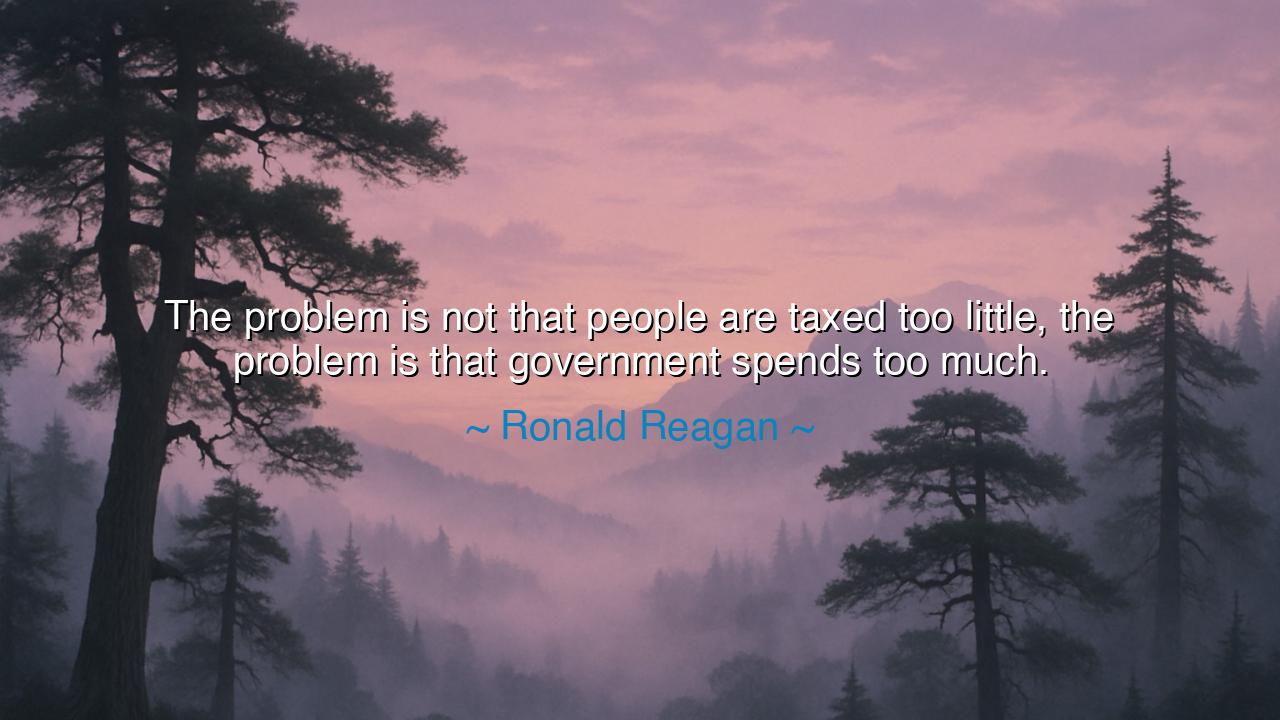
The problem is not that people are taxed too little, the problem
The problem is not that people are taxed too little, the problem is that government spends too much.






"The problem is not that people are taxed too little, the problem is that government spends too much." Thus spoke Ronald Reagan, a man who rose from humble beginnings to stand as a champion of liberty in an age of doubt and debt. His words, though simple in form, strike at a truth as old as civilization itself — that the prosperity of a people does not depend on the endless reach of their rulers, but on the restraint of their Government. When the state grows swollen with excess, it feeds not the welfare of the people but the appetite of power itself. Reagan’s voice was a call to remembrance — a reminder that freedom is not nurtured by the constant taking, but by the wise and careful stewardship of what is already given.
In his age, the burden of taxation had become heavy upon the shoulders of Americans. The people labored, and yet the fruits of their work seemed always consumed by the ever-expanding hunger of bureaucracy. Programs multiplied, promises grew, and with them, the debt of the nation deepened like a shadow across the land. Reagan, seeing this, understood that the disease of waste could not be cured by taking more from those who produced, but by teaching Government to live within its means — just as every household, every farmer, every craftsman must do. To tax more, he warned, was to punish creation; to spend less was to restore discipline.
The wisdom of this saying reaches far beyond economics. It speaks of a moral order, one that governs both nations and souls. For just as a man who spends beyond his means soon becomes a slave to debt, so too does a government that forgets prudence become enslaved to its own greed. When a state borrows without limit and promises more than it can deliver, it is not generosity that grows, but dependency. The people, once free to create and dream, find themselves chained to the failures of those who claimed to serve them. In this, Reagan’s warning echoes the wisdom of antiquity — that true liberty requires self-control, both in rulers and in citizens alike.
Consider the fate of ancient Rome, once the greatest power upon the earth. In its youth, it was disciplined, industrious, and proud. Its citizens paid fair tribute to sustain the common good, and its leaders ruled with frugality. But as wealth increased, so too did indulgence. The rulers taxed heavily to feed their wars, to fund their games, to purchase the loyalty of the masses with bread and spectacle. The treasury was emptied, and yet the spending grew. In the end, Rome fell not to the sword alone, but to the rot of extravagance — to the same truth Reagan spoke of: that when government consumes too much, it devours the very heart of the nation.
Reagan’s words also carried a faith in the people — a belief that individuals, not the state, are the true engines of progress. He saw that the strength of America lay not in government programs, but in the ingenuity and character of its citizens. “The problem,” he said, “is not that people are taxed too little,” for he trusted the people to use their earnings better than any bureaucracy could. He believed that a free man, left to his own vision and virtue, could create more wealth, more opportunity, and more compassion than any central authority could decree. His call was not against compassion, but against waste; not against helping others, but against systems that dulled the human spirit in the name of doing good.
The meaning of Reagan’s message, then, is a call to return to responsibility — not only for governments, but for all who wield any form of power. It is a warning that prosperity cannot be sustained by debt, nor virtue by dependency. The greatness of a nation lies not in how much it gives away, but in how wisely it manages what it has. The people, too, must learn this lesson — that freedom requires vigilance, and that every promise of easy wealth from the state must be weighed against the cost to liberty. For as government grows, the sphere of freedom shrinks.
The lesson is timeless: whether in the affairs of empires or in the household of a single soul, discipline is the guardian of abundance. Let no man or nation forget that spending without wisdom leads only to ruin, and that generosity divorced from prudence becomes its own kind of tyranny. Build your life, therefore, as Reagan urged a nation to build its future — upon the pillars of restraint, integrity, and self-reliance. Let governments govern lightly, and people live freely, each accountable for their own stewardship of wealth and opportunity.
So remember the wisdom of Ronald Reagan: the problem is not that men give too little, but that rulers take too much. The cure is not found in raising the tax, but in raising the standard of responsibility. For when Government learns to serve with humility and the people learn to live with discipline, then liberty thrives, prosperity grows, and the nation — like the man who governs himself — becomes truly free.






AAdministratorAdministrator
Welcome, honored guests. Please leave a comment, we will respond soon